
What's Going On is the eleventh studio album by American soul singer Marvin Gaye. It was released on May 21, 1971, by the Motown Records subsidiary label Tamla. Recorded between 1970 and 1971 in sessions at Hitsville U.S.A., Golden World, United Sound Studios in Detroit, and at The Sound Factory in West Hollywood, California, it was Gaye's first album to credit him as producer and to credit Motown's in-house session musicians, known as the Funk Brothers.

Levi Stubbs was an American baritone singer. He was best known as the lead vocalist of the R&B group the Four Tops, who released a variety of Motown hit records during the 1960s and 1970s. He was noted for his powerful, emotional, dramatic style of singing. In 1990, he was inducted into the Rock and Roll Hall of Fame as a member of the Four Tops.
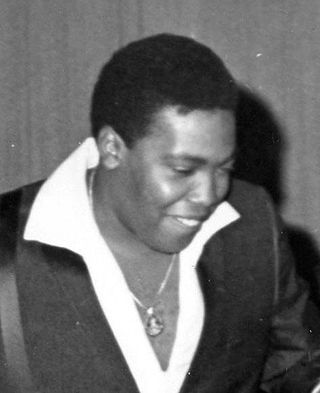
This is a photo of Renaldo (Obie) Benson, NOT Lawrence Payton Jr.
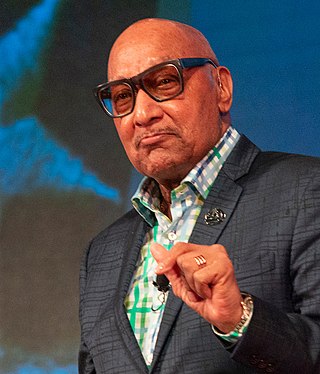
Abdul Kareem "Duke" Fakir was an American singer. He co-founded the Motown quartet the Four Tops and performed in an ensemble under that name from 1953 until shortly before his death. He was the group's last surviving original member.
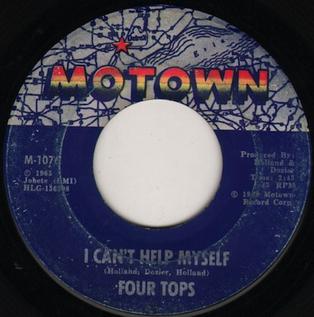
"I Can't Help Myself" is a 1965 song recorded by the Four Tops for the Motown label.

"Baby I Need Your Loving" is a 1964 hit single recorded by the Four Tops for the Motown label. Written and produced by Motown's main production team Holland–Dozier–Holland, the song was the group's first Motown single and their first pop Top 20 hit, making it to number 11 on the US Billboard Hot 100 and number four in Canada in the fall of 1964. It was also their first million-selling hit single.
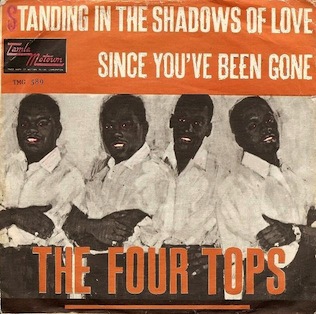
"Standing in the Shadows of Love" is a 1966 hit single recorded by the Four Tops for the Motown label. Written and produced by Motown's main production team Holland–Dozier–Holland, the song is one of the best-known Motown tunes of the 1960s. A direct follow-up to the #1 hit "Reach Out I'll Be There", "Standing in the Shadows of Love" reached #2 on the soul chart and #6 on the Billboard Hot 100 in 1967. It also reached #6 in the UK. Though the song was well-received, it has received some criticism. Author Martin Charles Strong notes that it rehashed the formula of "Reach Out I'll Be There" and achieved similar success by reaching the Top 10 in both the US and UK. It is ranked #470 on Rolling Stone's list of The 500 Greatest Songs of All Time in 2010 and #464 in 2004.

"Bernadette" is a 1967 hit song recorded by the Four Tops for the Motown label. The song was written and composed by Holland–Dozier–Holland, Motown's main songwriting team, and produced by Brian Holland and Lamont Dozier.

"7 Rooms of Gloom" is a song originally recorded by the Motown Records vocal quartet the Four Tops. It was released as a single in 1967 on the Motown label and reached #14 on the Billboard Hot 100, and was a Top 10 R&B Hit, charting at #10. It was also a hit in the UK, their seventh, staying for nine weeks in the UK Singles Charts and reaching #12 and in the Netherlands where it made #23 in the Dutch Top 40.

"What's Going On" is a song by American singer-songwriter Marvin Gaye, released in 1971 on the Motown subsidiary Tamla. It is the opening track of Gaye's studio album of the same name. Originally inspired by a police brutality incident witnessed by Renaldo "Obie" Benson, the song was composed by Benson, Al Cleveland, and Gaye and produced by Gaye himself. The song marked Gaye's departure from the Motown Sound towards more personal material. Later topping the Hot Soul Singles chart for five weeks and crossing over to number two on the Billboard Hot 100, it would sell over two million copies, becoming Gaye's second-most successful Motown song to date. It was ranked at number 4 in Rolling Stone's 500 Greatest Songs of all Time in 2004 and 2010.

The Magnificent 7 is a collaborative album combining Motown's premier vocal groups, The Supremes and The Four Tops. Issued by Motown in 1970, it followed two collaborative albums The Supremes did with The Temptations in the late 1960s. The album featured their hit cover of Ike & Tina Turner's "River Deep – Mountain High", which reached number 14 on the US Billboard Hot 100 singles chart. In the UK, the album peaked at number 6. In December 1971, Billboard reported UK album sales of 30,000 copies.
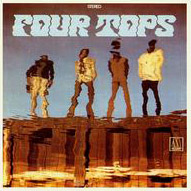
Still Waters Run Deep is a 1970 album by the American vocal group Four Tops.

"Ain't No Woman (Like the One I've Got)" is a song written by Dennis Lambert and Brian Potter, released as a single by the Four Tops on the ABC/Dunhill record label, from the album Keeper of the Castle. It peaked at number four on the U.S. Billboard Hot 100 the weeks of April 7 and 14, 1973, number one on the Cash Box Top 100 the latter of those two weeks, and became a gold record.
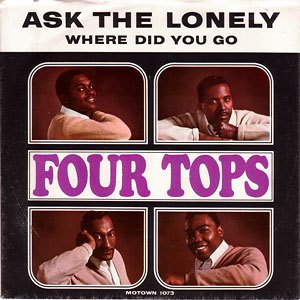
"Ask the Lonely" is a soul/pop ballad recorded by Motown singing group the Four Tops. Released as the group's third single, the single became the group's second successful single since signing with Motown in 1963. Released in 1965, the song rose to no. 24 on the pop chart and no. 9 on the R&B one. It is notable for being co-written by longtime Motown staffer Mickey Stevenson, as most of the group's hits on Motown were written and produced by Holland-Dozier-Holland. Levi Stubbs sang the lead, with The Andantes joining the other Tops on the background vocals. The music was performed by The Funk Brothers and the Detroit Symphony Orchestra provided the instrumentation.

The names of Renaldo (Obie) Benson and Lawrence Payton Jr have been mislabeled (reversed) on ALL photos. Please correct this and let them be remembered properly.

"Yesterday's Dreams" is a 1968 single recorded by The Four Tops for the Motown label. The song was written by Vernon Bullock, Jack Goga, Ivy Jo Hunter and Pam Sawyer. The single was one of the first the group released after the departure of Holland-Dozier-Holland, who had handled the majority of the Four Tops recordings prior to 1968. Released from the album of the same name, the song only became a modest hit on the US chart, peaking at #31 on Billboard's Best Selling Soul Singles chart and #49 on the Hot 100. Outside of the US, "Yesterday's Dreams" reached #23 in the UK.

The Ultimate Collection is a compact disc by The Four Tops, released on Motown Records, catalogue 314530825-2, in October 1997. It is a collection of singles comprising many of the group's greatest hits, with liner notes written by Stu Hackel.
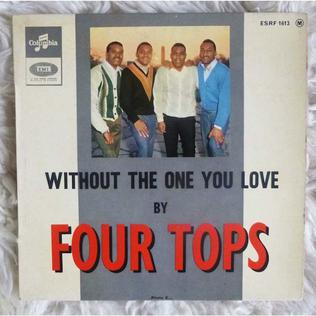
"Without the One You Love (Life's Not Worth While)" is a song written by Holland–Dozier–Holland and released as a single in 1964 by the Motown singing group The Four Tops as the second single from their self-titled debut album, Four Tops. The group would later cover the song with The Supremes.

"Something About You" is a song written by Holland-Dozier-Holland and was first released by the Four Tops on their 1965 album Four Tops' Second Album.
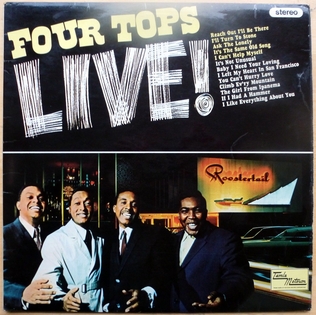
Four Tops Live! is the first live album by American rhythm and blues vocal band The Four Tops, released on Motown in 1966. The album was recorded as part of a series of concerts by the record label featuring their premier artists held in Detroit and had positive critical and commercial reception.




















